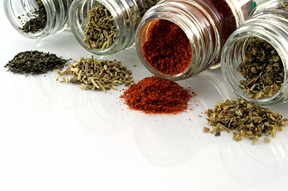Healthy Living: The Herbal Connection
By Dr. David Seaman
The concept of using herbs not just as seasonings on your food, but also to help promote health and prevent disease, has become more popular in recent years. Health food stores carry a variety of herbs as supplements, and so customers commonly enter a store looking for an herbal remedy for a given problem. It is important to understand the mindset of this behavior: People are looking for an herbal supplement to function like medication. And thus, the use of the term herbal medicine.
However, we often make a critically wrong assumption when using either pharmaceuticals or herbs that are pitched as drug replacements: It goes something like this: "If I take this drug or herb, it will negate the poor dietary habits that almost certainly caused my health condition in the first place." No medication or herb can do that, particularly if you don't change your dietary habits.
The mindset of most modern humans is such that we think drugs and/or herbs are supposed to make us better without any consideration for lifestyle. Take, for example, cardiovascular diseases such as atherosclerosis and hypertension. These all-too-common diseases develop as a result of a lifetime of poor eating and a lack of exercise, not simply because you've haven't taken the proper medications or herbs.
 Consider herbal supplements such as ginger, garlic and turmeric, which are often taken by people looking for a natural way, rather than a drug-based way, to prevent or treat disease. Even these herbs rarely cure diseases when taken as individual supplements. So, with that said, how should we view the utility of herbs? They play an important role as health-promoting additions to a healthy lifestyle highlighted by an appropriate anti-inflammatory diet.
Consider herbal supplements such as ginger, garlic and turmeric, which are often taken by people looking for a natural way, rather than a drug-based way, to prevent or treat disease. Even these herbs rarely cure diseases when taken as individual supplements. So, with that said, how should we view the utility of herbs? They play an important role as health-promoting additions to a healthy lifestyle highlighted by an appropriate anti-inflammatory diet.
While expression of various diseases is not completely understood, we do know chronic inflammation functions as the fuel that lights the fire to disease development and progression. Numerous inflammatory signaling molecules play a role in promoting disease activity, one of which is called nuclear factor kappa-B (NF-kB). Many conditions are known to be promoted by NF-kB, including arthritis, allergies, multiple sclerosis, obesity, atherosclerosis, heart attacks, cancer, Crohn's disease, psoriasis, Alzheimer's and diabetes.
Herbs such as those mentioned above are known to reduce the activity of NF-kB, which suggests they are useful in preventing and treating multiple diseases. Research supports this use of herbs. In other words, if you suffer from one of the above-mentioned conditions, you should embrace the addition of herbs to a healthy, anti-inflammatory diet. (Note: If you are taking medications, it is very important to make sure there are no potential herb-drug interactions. You doctor can make this determination for you.)
Since most diseases are promoted by chronic inflammation, we should endeavor to eat a diet that is anti-inflammatory. And this is one that derives most of its calories from lean meat, fish, vegetables, fruit, and nuts. All chronic diseases are known to develop when we veer from this foundational anti-inflammatory diet. All meals should be seasoned with a variety of spices, such as those mentioned earlier. Additionally, herbs can be taken as supplements on a regular basis. Ginger, turmeric, boswellia, and garlic are some of the most commonly supplemented herbs, and a strong body of research evidence demonstrates their anti-inflammatory abilities. They can be taken every day.
The overall goal should be to create a solid anti-inflammatory foundation with proper diet and herbal support. It is very important to embrace this foundation as the approach to disease prevention and health improvement. Talk to your doctor for more information.
David Seaman, MS, DC, DACBN, is the author of Clinical Nutrition for Pain, Inflammation and Tissue Healing. He has a master's degree in nutrition from the University of Bridgeport, Conn., and lectures on nutrition.

